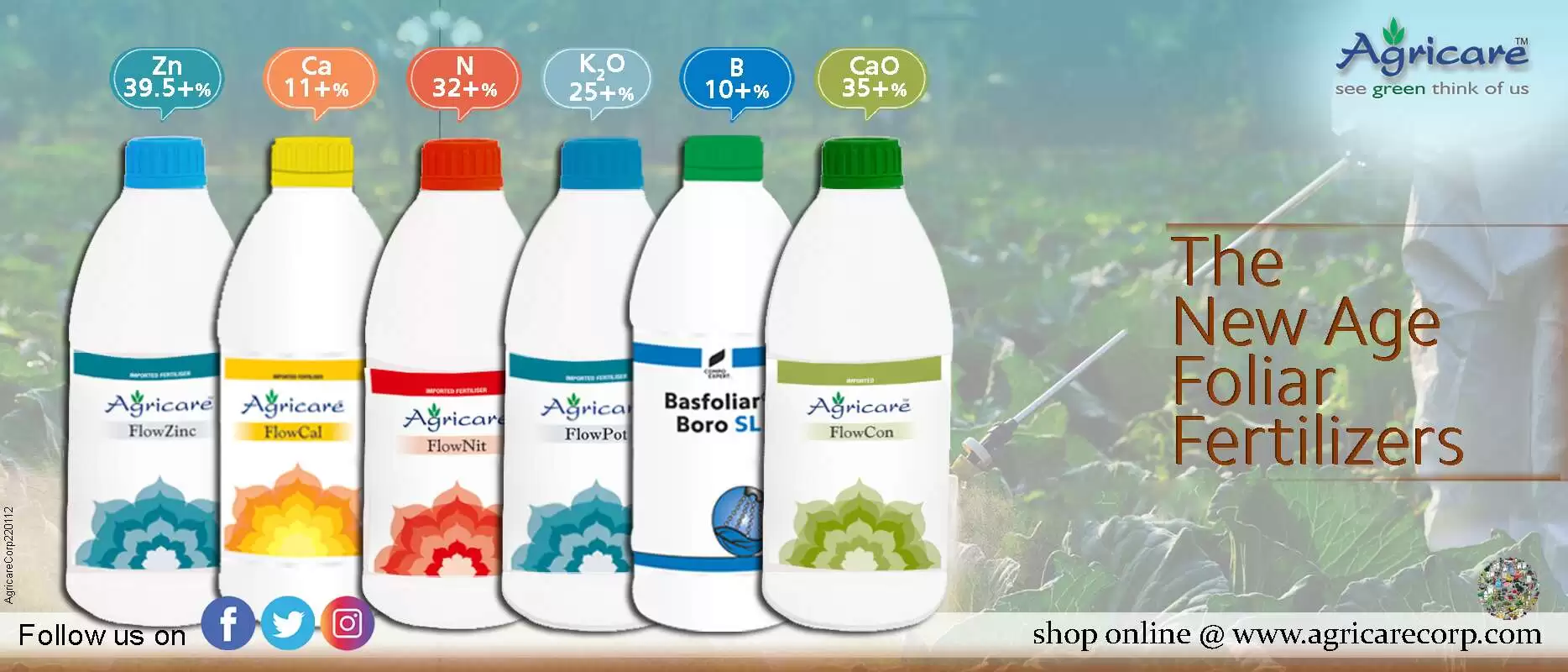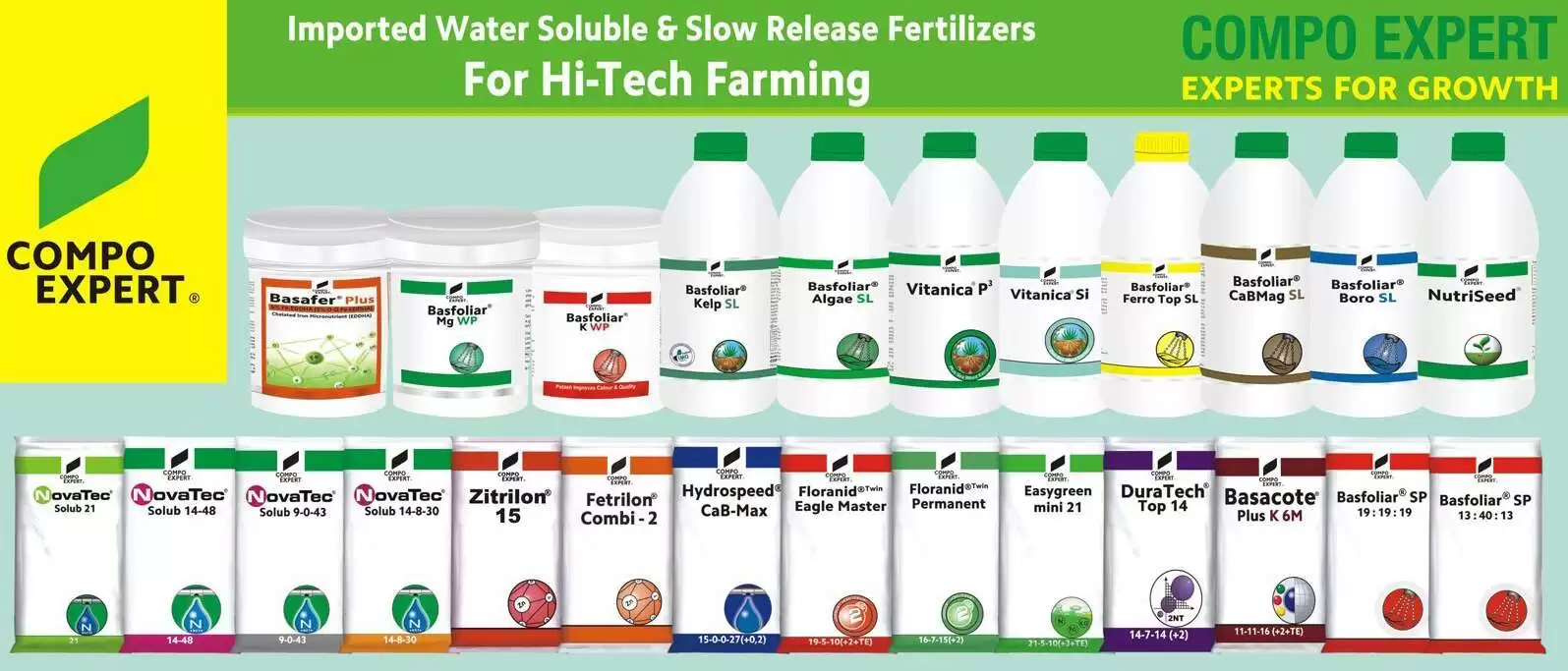Agricare Corporation
Friday, June 27, 2025
Real Farmer Review: Jagdish Prashad Grows Healthier Cucumbers with Effective Use of Nutrients
Tuesday, May 27, 2025
How a Farmer from Rajasthan Solved His Cucumber Problem – Must-Watch Story
Sanjay Chaudhry, a farmer from Sikar, Rajasthan, was facing a common issue in cucumber farming – fruit dropping and low yield. Like many farmers, he tried different methods, but nothing seemed to work well.
Then he came across a range of imported agricultural products from Compo Expert, available at Agricare Corporation. After using them, Sanjay noticed a big change in his farm:
-
The dropping of cucumber fruits stopped
-
The plant growth improved
-
The yield increased significantly
-
Fruits became healthier and better in quality
-
Water and nutrients were used more effectively
His success story is now inspiring many farmers across India.
👉 Watch the full story here: https://youtu.be/VEVvLepkC1k
If you are also facing similar problems in your farm, this video can help.
Wednesday, March 20, 2024
Understanding the Essentials: NPK Fertilizer
In the world of agriculture and gardening, the term NPK fertilizer is frequently mentioned, often accompanied by numbers representing different ratios. But what exactly is NPK fertilizer, and why is it crucial for plant growth? Let's delve into the basics and explore why this trio of nutrients is essential for cultivating healthy, thriving plants.
NPK
stands for nitrogen (N), phosphorus (P), and potassium (K), which are three
vital elements necessary for plant growth. Each of these nutrients plays a
unique role in various aspects of a plant's development:
1.
Nitrogen
(N): Nitrogen is crucial for the formation of amino acids, proteins, and
chlorophyll, all of which are essential for plant growth and photosynthesis. It
promotes lush, green foliage and overall plant vigor. Nitrogen deficiency often
results in stunted growth, yellowing leaves, and poor fruit or flower
production.
2.
Phosphorus
(P): Phosphorus is involved in several key processes within plants, including
root development, flowering, and fruiting. It aids in energy transfer and the
formation of DNA and RNA. Phosphorus deficiency can lead to weak root systems,
delayed maturity, and poor seed or fruit production.
3.
Potassium
(K): Potassium helps regulate various physiological processes in plants, such
as water uptake, photosynthesis, and enzyme activation. It contributes to
disease resistance, stress tolerance, and overall plant health. Potassium
deficiency may manifest as weak stems, leaf scorching, and susceptibility to
pests and diseases.
The
numbers displayed on NPK fertilizer labels represent the percentage of each
nutrient in the product, in the order of nitrogen-phosphorus-potassium. For
example, a fertilizer labeled as 10-10-10 contains 10% nitrogen, 10%
phosphorus, and 10% potassium by weight.
Choosing
the right NPK ratio depends on the specific needs of the plants being grown and
the stage of growth. For instance, a high-nitrogen fertilizer (such as
20-10-10) is suitable for promoting vegetative growth in leafy greens and
grasses. In contrast, a balanced fertilizer (like 10-10-10) is suitable for
general-purpose use on a variety of plants. Fertilizers with higher phosphorus
(e.g., 5-10-5) are ideal for encouraging flowering and fruiting in plants.
However,
it's essential to use NPK fertilizers judiciously, as excessive application can
lead to nutrient imbalances, environmental pollution, and harm to beneficial
soil organisms. Soil testing can help determine nutrient deficiencies and guide
fertilizer application rates.
In
summary, NPK fertilizer is a cornerstone
of plant nutrition, providing essential nutrients needed for healthy growth and
development. Understanding the roles of nitrogen, phosphorus, and potassium and
their respective ratios empowers gardeners and farmers to make informed decisions,
resulting in vibrant, productive plants and bountiful harvests.
Saturday, February 10, 2024
Nurturing the Earth: The Impact of Soil Conditioners on Agricultural Growth
In the quest for sustainable and productive agriculture, soil conditioners emerge as unsung heroes, playing a crucial role in enhancing soil health and promoting robust plant growth. These often-overlooked amendments are instrumental in transforming ordinary soil into a fertile foundation for thriving crops.
Soil
conditioners are substances added to soil to improve its physical, chemical,
and biological properties. They address various soil issues, including
compaction, nutrient deficiency, and poor water retention. One of the primary
benefits of these conditioners is their ability to break down compacted soil,
creating a more porous structure that allows roots to penetrate easily and
access essential nutrients.
The
enrichment of soil fertility is a key aspect of soil conditioners. These
amendments enhance nutrient availability by improving soil structure, enabling
better absorption of essential elements by plant roots. This nutrient boost
translates into healthier plants, increased yields, and improved overall crop
quality.
Water
retention is another critical factor influenced by soil conditioners. In
regions facing water scarcity, these amendments help soil retain moisture,
reducing the frequency and volume of irrigation needed. This not only conserves
water but also contributes to sustainable agricultural practices by optimizing
resource utilization.
Furthermore,
soil conditioners contribute to the biological diversity of the soil. They
promote the growth of beneficial microorganisms that aid in nutrient cycling
and pest control. This microbial activity creates a harmonious ecosystem within
the soil, fostering an environment conducive to plant growth and resilience.
Organic
and synthetic soil conditioner offers options for
farmers based on their preferences and specific agricultural needs. Organic
alternatives, such as compost and manure, contribute to soil health in a
natural and sustainable manner. Synthetic conditioners, on the other hand, are
engineered for specific soil deficiencies and provide targeted solutions.
As
the global demand for food continues to rise, the role of soil conditioners in
sustainable agriculture becomes increasingly vital. By investing in the health
of the soil, farmers can ensure long-term productivity, reduce environmental
impact, and contribute to a more resilient and sustainable food supply chain.
In essence, soil conditioners pave the way for a greener, healthier planet, one
enriched soil at a time.
Friday, January 19, 2024
Nourishing Growth: Unveiling the Power of Liquid Fertilizers for Lush Gardens
In the ever-evolving realm of gardening, where every bloom tells a unique story of care and dedication, liquid fertilizers emerge as the unsung heroes, transforming ordinary soil into a nutrient-rich haven for plants. This blog delves into the fascinating world of liquid fertilizers, unlocking the secrets behind their effectiveness and exploring the myriad benefits they bring to gardens of all sizes.
Liquid fertilizers, often hailed as the elixir for plants, come in various formulations, each tailored to meet specific nutritional needs. From nitrogen-rich solutions fueling robust leaf development to phosphorous-packed concoctions promoting sturdy root systems, and potassium-infused blends enhancing overall resilience, these liquid wonders offer a customizable approach to plant care.
What sets liquid fertilizers apart is their rapid absorption rate. Unlike traditional granular fertilizers that require time to break down and release nutrients, liquids are quick to permeate the soil, delivering an instant boost to hungry plants. This immediacy proves invaluable, especially during critical growth stages or when plants exhibit signs of nutrient deficiency.
The versatility of liquid fertilizers extends beyond the garden bed. Suitable for both outdoor and indoor plants, they provide a convenient solution for urban gardeners, offering a mess-free application and ensuring precise nutrient delivery. Their compatibility with various irrigation systems further streamlines the fertilization process, making it accessible to gardeners of all skill levels.
This blog will guide readers through the application of liquid fertilizers, offering insights into proper dosage, frequency, and timing for optimal results. From promoting vibrant flower displays to increasing fruit yields, liquid fertilizers act as catalysts for a garden's full potential.
Additionally, the environmental impact of liquid fertilizers will be explored, showcasing eco-friendly formulations that prioritize sustainability without compromising efficacy. With a focus on responsible gardening practices, this blog aims to empower readers to make informed choices that benefit both their plants and the planet.
Join us on a journey through the liquid fertilizer landscape, where science meets nature, and the essence of nurturing growth is unlocked in every drop. Discover the transformative power that lies within these liquid gems and witness your garden flourish like never before.
Saturday, September 30, 2023
High performance and fuel efficiency of zero turn mower
Taking
care of your lawn needs you to have the correct equipment on hand. For
sharp, clean results in record time, you’ll want to look into zero turn
mower. Developed back in the 1960s, these mowers attained their closed-turning
style from cultivating equipment. They’re extremely beneficial and practical
for private landowners and skilled landscapers alike.
Agri Care
Corp is proud to be your local zero-turn lawn mower dealer. We pride ourselves
on offering our buyers value, superiority, service and honour.
Navigational
Prowess
The
most obvious and lauded benefit of a zero-turn mower is how effortless it is to
handle. The sharp, zero-radius turns that provide the machine its name permit the
mower to navigate tight spaces and get very close to obstacles. This authorizes
you to smoothly mow lawns with lots of trees, fences, flower beds, garden patches,
shrubs and so forth.
If
the land you mow for your clients is dotted with these obstacles, then a zero
turn mower will help you to smoothly navigate around them. You’ll be
able to mow the surrounding grass fast without having to make another pass with
another appliance like a trimmer.
High
Performance
Compared
to other kinds of mowers, zero-turn lawnmowers are incredibly efficient and
perform very well. The tight zero-radius turns allow you to cut every patch of
fodder evenly without having to go over and over the same spots numerous times
or pass back on your next turn to give it another shot.
Zero-turn
mowers are furthermore much faster than other lawnmowers, sometimes even twice
as fast! Certain prototypes can reach rates of up to 13 miles per hour.
Although this isn’t a useful cutting speed, it does make it easier for you to
get between areas that require mowing much faster, saving you more time.
Greater
Fuel Efficiency
Gas-powered
zero-turn mowers’ high performance means that your mowing time is lessened, so
you’ll spend less fuel and get more work done per gallon. That saves you money
and helps you to lessen your carbon footprint. Some zero-turn lawnmowers can
even run on other power sources, like battery-operated electric motors, which
produce zero emissions and need no gasoline at all. This can save you even more
money!
Thursday, August 31, 2023
Electric lawn mower maintenance and care
Unlike
petrol mowers, an electric lawn mower is a tremendous
endurable alternative that is smaller, easier to manoeuvre, and has no
requirement to fast run to the servo for power.
So,
whether you have a small lawn or patio, or a limitless field of pleasing green
under your feet, know what you require to update your gardening gear with the
best variety of electric lawn mower for you.
What
to deem when purchasing an electric lawn mower
If
you’ve made the conclusion to buy an electric lawn mower from Agri Care Corp,
deem the following features to make sure it is right for you:-
- Check the cutting
diameter – the wider it is, the additional lawn it will catch
- The same gets on
for wheels – the bigger, the easier to manoeuvre
- Check the battery
duration and voltage – 45 minutes and up is a reasonably good amount of
time
- Does the mower just
take a detailed brand of battery? Can you buy extra ones?
- Consider the
convenience of the handle, your strength and the weight of the mower, and
the relief of turning on and modifying settings
- Height adjustment –
distinct heights will result in different lawn therapies – mulching,
cutting, or trimming
- For corded electric
lawn mowers, ensure the cord is long adequately for you, or you may like
to buy a retractable extension cord
- A safety key for
battery-powered lawnmowers is a reasonable opportunity for those with
kids
Electric
lawn mower maintenance and care
While
all electric lawn mowers are slightly distinct, there are some key facets to
note to keep your lawn mower’s longevity:-
- Electric lawnmowers
are not waterproof, so be sure to store them in the shelter before and
after use
- Change the blades
regularly
- Proceed to clear
out the undercarriage occasionally for grass clippings
- Lubricate the reels
regularly
- Give your electric
lawn mower the once-over every now and again: check the bolts and
fasteners, blow out the battery compartments, hone the blades, and get rid
of dust and built-up debris
- If you have a
battery-powered electric lawn mower, store the batteries inside so they
don’t get too cold, which influences the battery shelf life, and store
them totally arrested.
Real Farmer Review: Jagdish Prashad Grows Healthier Cucumbers with Effective Use of Nutrients
Author: Team Agricare Growing cucumbers can be tough, particularly for farmers who experience fruit drop, pest infestation and poor yield. B...

-
In the ever-evolving realm of gardening, where every bloom tells a unique story of care and dedication, liquid fertilizers emerge as the uns...
-
It will take time and work to maintain the hedge. Your requirements will be complemented by the greatest gas hedge trimmer. The majority o...
-
Author: Team Agricare Growing cucumbers can be tough, particularly for farmers who experience fruit drop, pest infestation and poor yield. B...








